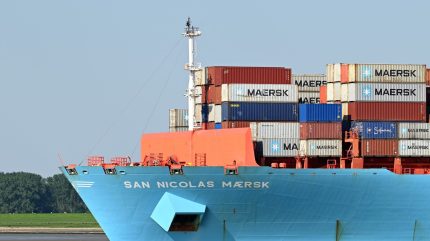
Shipping and logistics giant A.P Moller – Maersk has joined a study into the feasibility of nuclear-powered container shipping.
The research is conducted by maritime classification and compliance company Lloyd’s Register and nuclear engineering company Core Power, and will research the regulatory feasibility and frameworks necessary for nuclear-powered container shipping.
The industry has long considered nuclear fuel for commercial shipping as an avenue for reducing carbon emissions, however, it has been a contested area due to safety and waste management concerns.
Assessing the practicalities of nuclear fuel
To ascertain the practicalities of nuclear-powered cargo shipping, the study will assess the frameworks necessary for a container ship that would use a fourth-generation nuclear reactor in Europe.
Lloyd’s Register explained the joint study will look to understand what safety requirements would have to be in place for nuclear fuel and gain an understanding of operations.
The study also hopes to provide intelligence for other companies in the maritime value chain who are interested in exploring business cases for nuclear power as a route to achieving net zero.

US Tariffs are shifting - will you react or anticipate?
Don’t let policy changes catch you off guard. Stay proactive with real-time data and expert analysis.
By GlobalDataNuclear shipping for net zero
As a relatively high-carbon industry with shipping accounting for roughly 3% of global emissions, the industry is under pressure to find low-carbon solutions.
Despite concerns about the safety and logistics of nuclear fuel for cargo shipping, Core Power’s CEO Mikal Bøe indicated in a statement that net-zero ambitions for the sector would be unlikely to be achieved without the use of nuclear power.
“There’s no net zero without nuclear,” he said.
“A critical key to unlocking the vast potential for nuclear energy to transform how the maritime sector is powered is the standards framework for commercial insurability of floating nuclear power plants and nuclear-powered ships that would operate in nearshore environments, ports, and waterways.”
Ole Graa Jakobsen, head of fleet technology at Maersk, also weighed in on the significance of this study scoping out the validity of this avenue for decarbonisation.
Noting the challenges of safety, waste management and regulatory acceptance, he explained that if these obstacles could be addressed through the development of new fourth-generation reactor designs then “nuclear power could potentially mature into another possible decarbonization pathway for the logistics industry 10 to 15 years in the future”.



